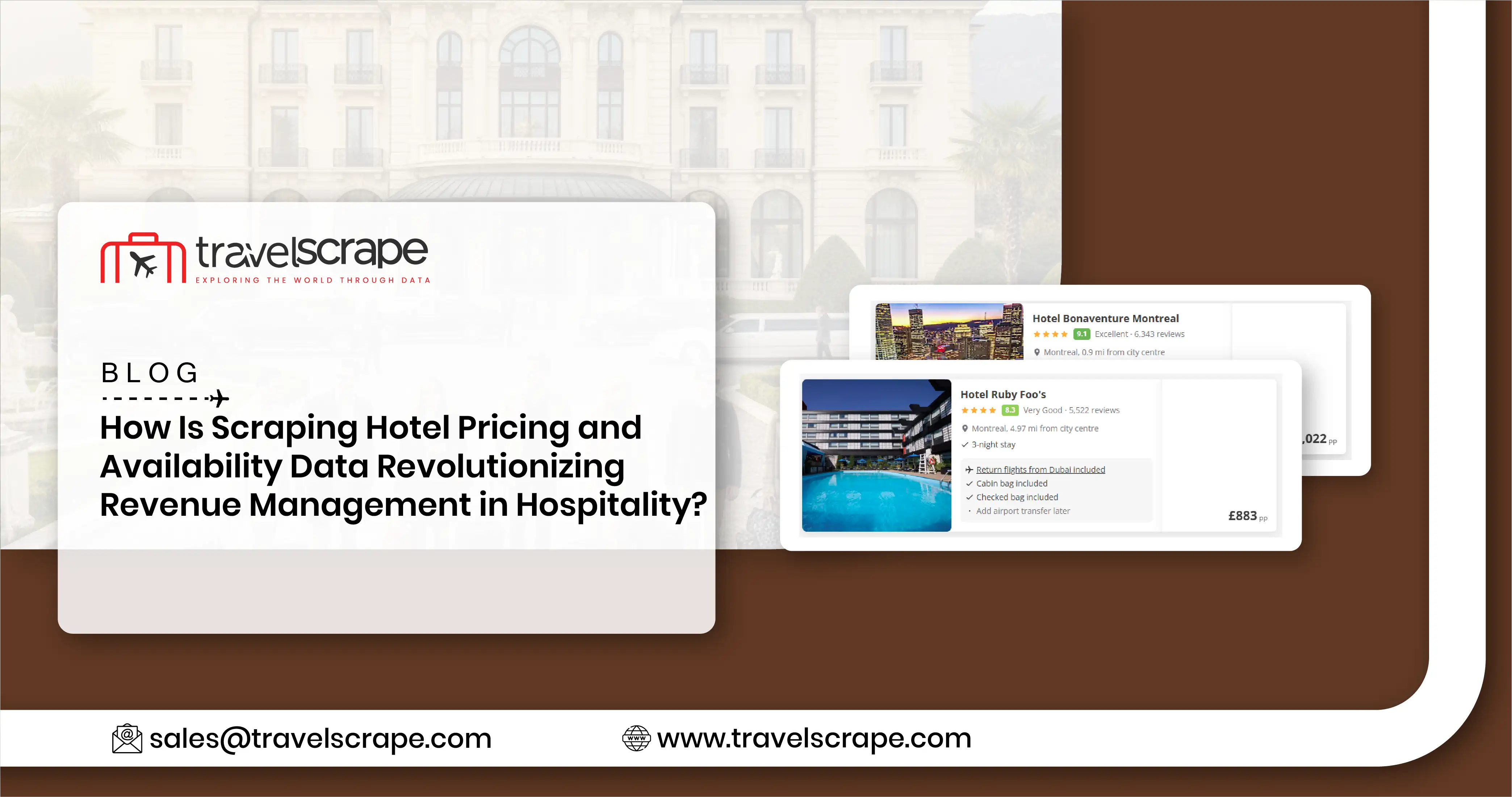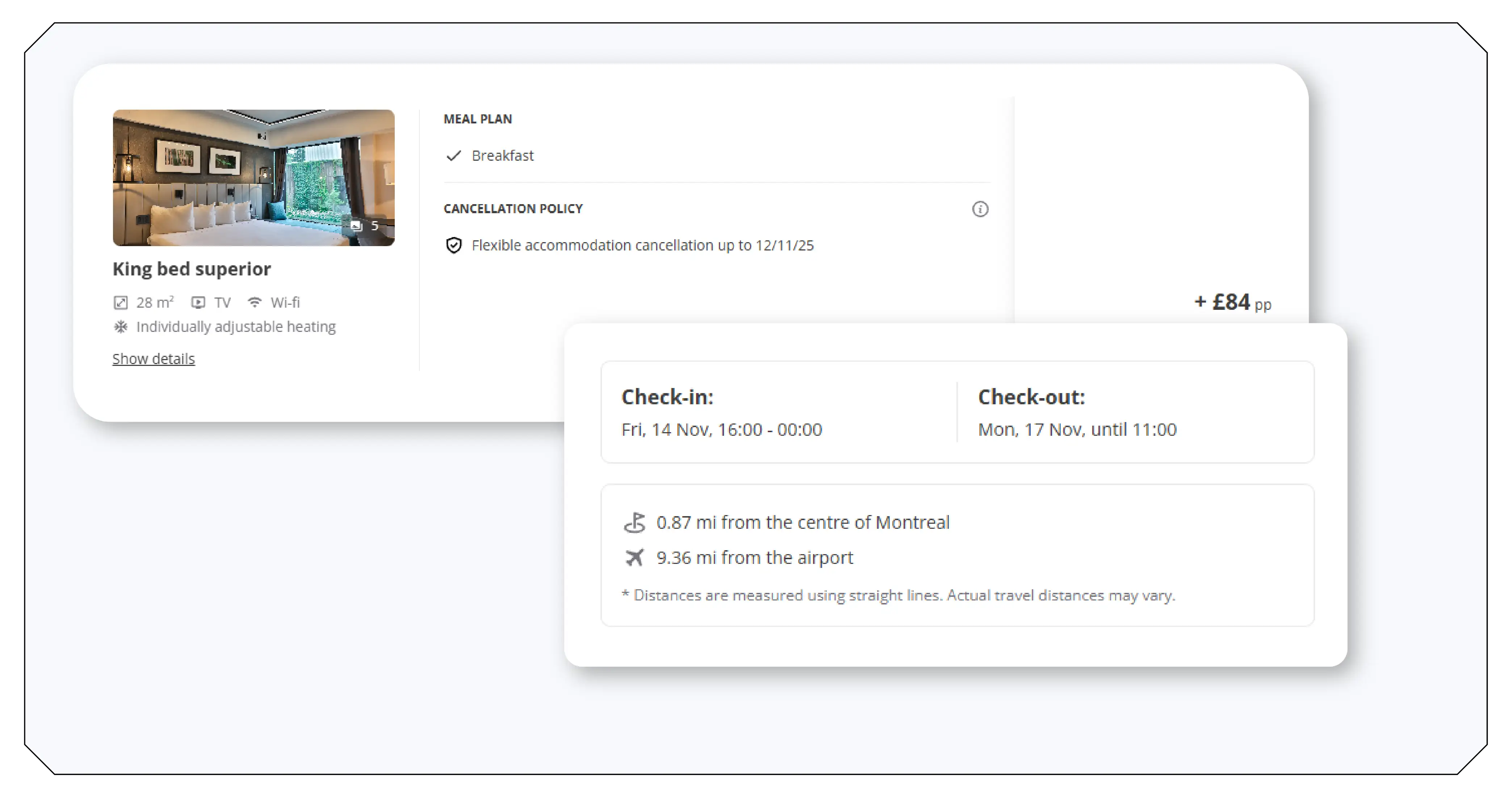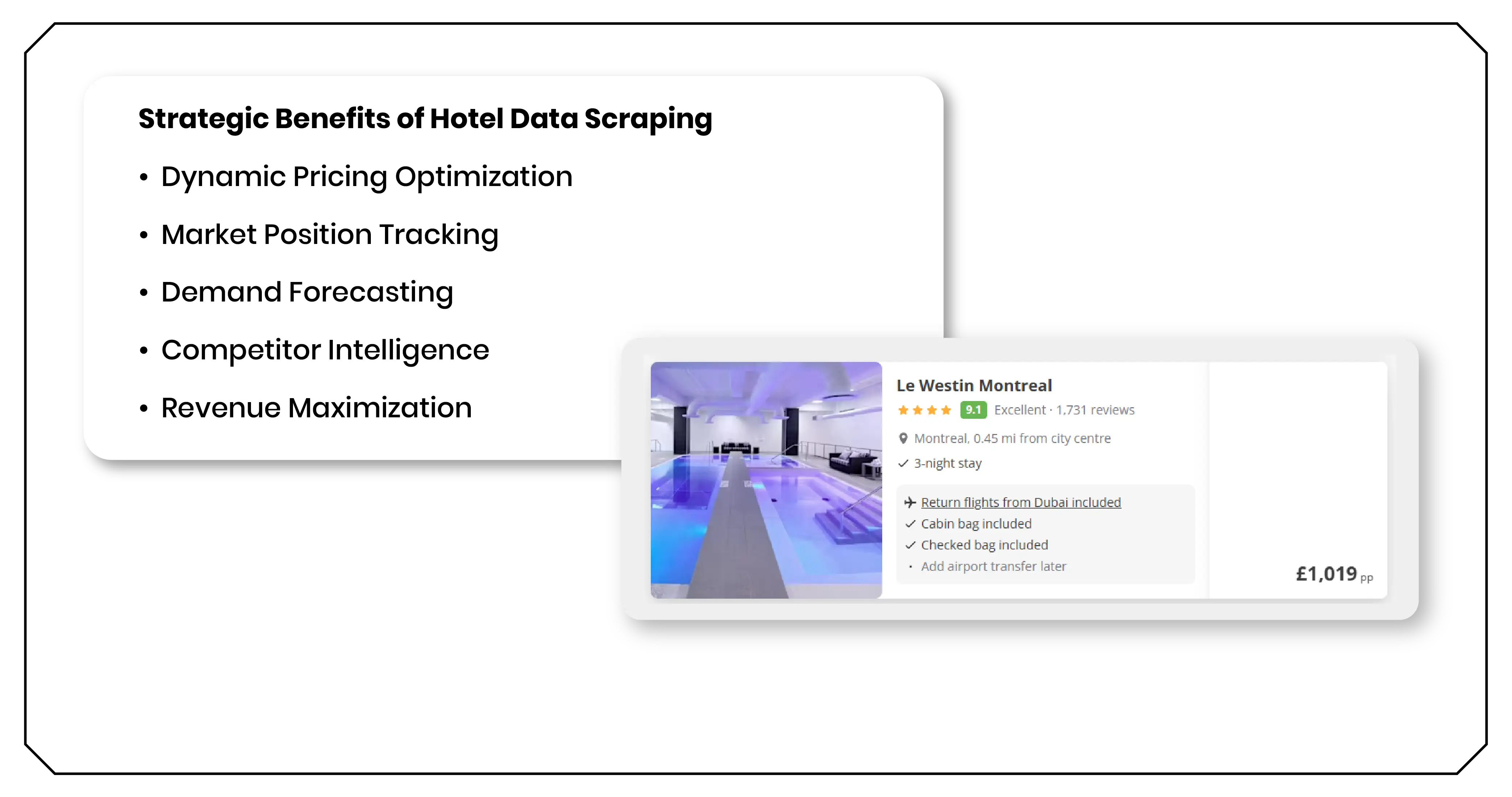How Is Scraping Hotel Pricing and Availability Data Revolutionizing Revenue Management in Hospitality?

Introduction
In the fast-evolving hospitality landscape, Scraping Hotel Pricing and Availability Data has become a powerful approach for hotels, travel agencies, and analysts to understand market dynamics, stay competitive, and maximize revenue. With millions of listings updated hourly on leading Online Travel Agencies (OTAs) like Booking.com, MakeMyTrip, Agoda, and EaseMyTrip, manually keeping track of room rates, occupancy, and guest sentiments is virtually impossible. This is where Hotel Data Scraping Services come into play — enabling businesses to automate the collection of structured, real-time data from hotel booking platforms for deeper insights.
In this digital age, the ability to Scrape Hotel Pricing Data from OTAs provides the foundation for building smarter pricing models, understanding consumer behavior, and forecasting market trends. By systematically extracting hotel rates, reviews, and sold-out statuses, hospitality businesses can evaluate their own position against competitors, identify demand fluctuations, and adapt their pricing strategies in real-time. This blog explores the process, benefits, and analytical power of hotel data scraping and how it transforms decision-making in the travel and hospitality industry.
Understanding the Power of Hotel Data Extraction

Every OTA — whether it’s Booking.com or Agoda — contains vast amounts of structured and unstructured data: room categories, rate plans, promotional discounts, review scores, location data, and availability status. Extracting these details offers a comprehensive picture of the hotel market landscape. For instance, analyzing reviews through a Hotel Guest Review Dataset can uncover sentiment patterns — what travelers appreciate most, common complaints, or service issues that impact booking decisions.
Moreover, through method to Extract Hotel Availability and Rate Data, hoteliers can identify when competitors are fully booked, when they drop prices to attract last-minute guests, or when they introduce limited-time promotions. This allows revenue managers to create precise, data-driven strategies to optimize occupancy rates and maintain profitability even during off-peak periods.
Techniques to Extract Hotel Rates, Reviews, and Availability
Hotel data scraping is performed using specialized tools and APIs that interact with OTA platforms. A well-designed scraper can collect real-time information such as:
- Room type, pricing, and occupancy status
- Cancellation policies and breakfast inclusions
- User ratings and written feedback
- Nearby hotel pricing and rank on OTA listings
Advanced scraping pipelines leverage Hotel Data Intelligence systems to interpret the raw data into actionable insights. These systems ensure that the extracted information remains clean, deduplicated, and continuously updated. For example, by monitoring the rate changes for specific dates, hotels can predict when competitors are likely to adjust prices in response to seasonal demand or local events.
Hotels can also benefit from integrating machine learning into their scraping workflows to forecast booking patterns and price elasticity. Using historical data, AI models can predict the optimal price point that balances high occupancy and profitability.
Weekday vs. Weekend Pricing Analysis
One of the most insightful applications of Web Scraping Hotel Room Prices Data is analyzing the difference between weekday and weekend pricing. Business travelers usually dominate weekday bookings, while leisure travelers drive weekend demand. By scraping data across multiple days and comparing the trends, hotels can identify when to adjust rates dynamically.
For example, if weekend prices remain flat while competitors increase rates due to regional events, a property might be missing an opportunity to capture additional revenue. Similarly, during weekdays, if data shows that nearby hotels lower rates to attract corporate travelers, a hotel can adjust its strategy to maintain competitiveness.
By developing a Hotel Room Price Trends Dataset, hoteliers can visualize these fluctuations over time. It helps pinpoint when occupancy rates are highest, how pricing reacts to seasonality, and when to introduce discounts or bundled offers. Such analyses lead to smarter inventory management and improved revenue performance.
Tracking Demand Surges and Sold-Out Patterns
Another essential benefit of scraping OTA data is understanding demand surges and scarcity signals. Through Real Time Scrape Hotel Rate Optimization, data can be continuously collected to monitor when rooms sell out, how quickly they are booked, and which dates experience unusually high activity.
During peak travel seasons, large events, or holidays, demand spikes can occur suddenly. With real-time scraping systems, hotels can instantly detect these trends and raise prices accordingly to maximize profits. Conversely, when occupancy rates decline, scraped data can help managers identify when and where competitors are offering discounts, enabling quick counter-strategies.
For example, analyzing sold-out hotels in popular tourist destinations during long weekends can help identify demand clusters. This insight allows for future rate planning, ensuring hotels capitalize on recurring booking patterns.
Review Sentiment Analysis and Brand Positioning
Customer reviews are one of the strongest drivers of booking decisions. With the help of a Hotel Guest Review Dataset, businesses can perform sentiment analysis to gauge customer satisfaction levels and identify service gaps. By categorizing reviews into themes like cleanliness, amenities, staff behavior, and food quality, hotels can recognize areas for improvement.
Additionally, reviews from OTA platforms can be compared across competitors to assess brand positioning. For instance, if a competitor’s reviews frequently highlight superior breakfast offerings, a hotel can adjust its dining services accordingly. Sentiment trends over time also indicate how recent operational changes — such as renovations or service upgrades — are being perceived by guests.
By combining review analytics with pricing data, hotels gain a 360-degree view of their performance in the marketplace.
Strategic Benefits of Hotel Data Scraping

Data scraping from OTAs offers a multitude of benefits beyond price comparison. Key advantages include:
- Dynamic Pricing Optimization: Continuously adjusting room rates based on real-time market data ensures hotels remain competitive without compromising profitability.
- Market Position Tracking: Understanding where a hotel ranks on OTA listings allows for better visibility and promotional adjustments.
- Demand Forecasting: Scraped booking data highlights patterns in guest behavior, helping forecast future occupancy.
- Competitor Intelligence: Detailed comparison of rates, promotions, and guest feedback reveals competitor strategies.
- Revenue Maximization: With timely data, hotels can capture higher margins during demand peaks and minimize losses during slow periods.
These insights empower hotel owners, travel consultants, and data analysts to stay ahead in an industry driven by constant change.
The Future of OTA-Based Hotel Analytics
As OTAs expand globally and integrate AI-driven recommendation systems, the complexity of pricing models will continue to grow. Hotel chains that leverage automated scraping systems will hold a significant competitive advantage. With richer data and enhanced analytics, they can create personalized pricing models tailored to customer segments, loyalty tiers, and booking patterns.
Integrating scraped OTA data with internal booking systems allows hotels to predict customer preferences more accurately. AI-driven dashboards can automatically recommend optimal rates, detect anomalies, and visualize the correlation between pricing and occupancy. The combination of automation and analytics ensures that decision-making remains proactive rather than reactive.
How Travel Scrape Can Help You?
- Comprehensive Rate and Availability Tracking
Our hotel data scraping solutions collect real-time room prices, occupancy levels, and sold-out patterns from major OTAs. This enables hotels and travel platforms to monitor competitor rates, detect demand shifts, and respond instantly with optimized pricing strategies. - Sentiment and Review Analysis
We extract detailed review data, including guest ratings and written feedback, allowing you to analyze customer sentiment and identify service strengths or weaknesses. This data helps improve guest experience and brand reputation management. - Customized Market Intelligence Dashboards
Our tools transform raw scraped data into insightful visual dashboards, showcasing pricing trends, demand surges, and competitor positioning. This makes it easier for decision-makers to act on data-driven insights for revenue optimization. - Dynamic Pricing and Forecasting Support
By analyzing historical pricing trends and current market fluctuations, our services support predictive modeling for pricing and occupancy. This helps hotels implement smarter rate adjustments and anticipate market changes. - Seamless Integration and Scalable Solutions
Our hotel data scraping services integrate easily with your CRM or revenue management systems. We offer scalable APIs and datasets, ensuring consistent, automated updates for large-scale hotel networks or regional analysis.
Conclusion
In an era where data dictates business performance, the ability to Scrape OTA Listings for Price Benchmarking enables hospitality players to act with precision. Whether it's comparing rates across platforms or forecasting future availability, the analytical advantage is undeniable. By utilizing OTA rate comparison datasets, hotels can position themselves effectively in a crowded marketplace, identifying patterns that lead to profitable rate adjustments and targeted promotions.
Ultimately, integrating a Hotel Availability Forecast Dataset into hotel management systems ensures decisions are guided by facts, not assumptions. From understanding traveler sentiment to identifying market gaps, web scraping empowers hotels to evolve into intelligent, data-driven enterprises. In the competitive world of hospitality, data isn’t just information — it’s the key to strategic dominance.
Ready to elevate your travel business with cutting-edge data insights? Scrape Aggregated Flight Fares to identify competitive rates and optimize your revenue strategies efficiently. Discover emerging opportunities with tools to Extract Travel Website Data, leveraging comprehensive data to forecast market shifts and enhance your service offerings. Services helps stay ahead of competitors, gaining instant insights into bookings, promotions, and customer behavior across multiple platforms. Get in touch with Travel Scrape today to explore how our end-to-end data solutions can uncover new revenue streams, enhance your offerings, and strengthen your competitive edge in the travel market.